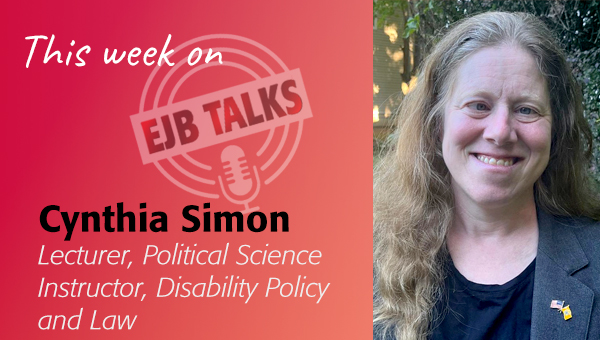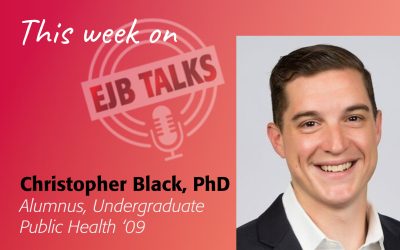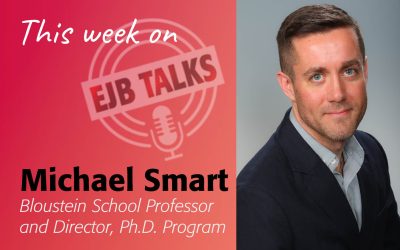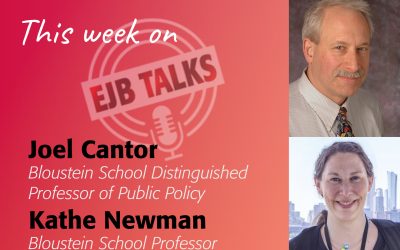As we continue to bring awareness to the Bloustein School’s new Disability Studies minor, dean Stuart Shapiro talks to Professor Cynthia Simon, who is teaching the inaugural course for the minor this semester. Growing up as a child with a disability, Simon shares how her early studies about the civil rights movement piqued her interest in political science and law and eventually led to teaching disability studies. She talks about the importance of including people with disabilities in the discussions of diversity, equity, and inclusion. The conversation also touches on the evolution of language used to describe disabilities and the distinction between access and inclusion. Simon’s goal is to educate students about disability civil rights policies and foster an understanding of the diverse experiences within the disability community.
We also recently sat down to talk more with Simon about her path to disability advocacy and education — you can read more here.
Transcript:
Stuart Shapiro
Welcome to EJB Talks. I’m Stuart Shapiro, the dean of the Bloustein School. And the purpose of this podcast is the highlight the work, my colleagues and our alumni in the fields of policy, planning and health are doing to make the world a better place.
Today, we are highlighting our new disability studies minor, which we are very excited about. And speaking with Professor Cynthia Simon, who teaches the introductory course of that minor. Welcome to the podcast.
Cynthia Simon
Thank you.
Stuart Shapiro
So you have a background in political science, which is somewhat near and dear to my heart and to law. Which is also somewhat near and dear to my heart. But tell me about your journey from those fields to teaching disability studies.
Cynthia Simon
Sure. So I started as a child and as many children with disabilities are, I was the target of all sorts of discrimination and inappropriate conduct and all that kind of stuff. And when I got to middle school, and I learned about the Civil Rights Movement, I thought, wow, after being slaves, after Jim Crow, after all these horrible things that were done — the Blacks, they stood up and fought for their rights. And I said, if Blacks can do that, the rest of us should do that. The rest of us can do that. And I wanted to go into politics. I wanted to do what had been done by leaders in the civil rights movement. And I came to Rutgers and I studied political science, and I got to my senior year and I said, well okay, I want to be politically active, I want to be politically involved. I also need a job I can make money in.
Stuart Shapiro
That reality hits a lot of people! (laughing)
Cynthia Simon
(laughing) Yeah, you know, and I’m like, oh, so what am I going to do? I want to go to Eagleton Institute of Politics and get my masters there, I know that. But what do I want to do to make money so that I also have time to be politically engaged and politically active, I decided to go to law school. And I graduated from law school. And due to a combination of disability discrimination, my desire not to relocate, and the absolutely, horrific state of public transportation in the state of New Jersey, I ended up without a job.
So I was like, okay, I gotta do something while waiting for my bar results back before I throw out my own shingle. And I worked on a campaign. It was a presidential election year. So I did that. And one of my friends who was an adjunct faculty member at William Paterson said, hey, I’ll bring your resume in, maybe they need somebody. And in the spring of 1997, as I was starting my law practice, I got asked, hey, you want to teach? And I fell in love with it.
I started teaching political science and law and some other topics as well. And I said, I’m gonna go back, get my PhD, become a full-time political scientist. And I met with, among other issues, discrimination in that process as well. And I made a life choice to focus on my advocacy work and my family, and to continue working as adjunct faculty.
And many years down the line, William Paterson, which is one of the places I work at, started a Disability Studies major, and I went, wow, that really speaks to me. And I spoke to the folks who were running it. And that was my first actual experience teaching Disability Studies. I always had an interest in disability policy even before that, and advocacy work and that kind of thing. But that’s how I ended up teaching disability studies.
Stuart Shapiro
That’s great. So it’s interesting that William Paterson sort of was, sounds like, a trailblazer, a little bit in this area. And it’s nice to see Rutgers jump on to this trend. Why do you think the time is right? Or perhaps overdue, given that we’re behind William Paterson for a minor and maybe a major in disability studies?
Cynthia Simon
So individuals with disabilities, of course, are a marginalized group. We have our own, you know, very common set of lived experiences and the like. Yet oftentimes, when people talk about diversity, equity, and inclusion, talk about trying to understand the lived experiences of various different groups within this country, we get ignored. So, you know, it was really nice to see William Paterson have it. When I approached Rutgers about working for Rutgers, it was right as the Disability Studies minor was being created, and it was like, wow, this is great I get to be part of this.
Cynthia Simon
It’s so important that our voices are heard. That we have a place at the table as people with disabilities. And that people understand. I mean, a lot of times people just have no idea what it’s like to be a person with a disability and you know, the history of how we’ve been treated and that kind of stuff.
Stuart Shapiro
Yeah, none of us are very good at imagining what it’s like to be in someone else’s shoes. It takes work, and it takes dedication, and it takes effort by people like yourself to educate. What do your students bring to the classroom? Are they people who have had similar experiences to you? Are they people who are just curious in this new frontier of civil rights? What kind of students are you getting? What do they bring to the classroom?
Cynthia Simon
So, I’m getting a combination of students at Rutgers. I teach disability politics, which is in the political science department, and I also teach the disability policy and law course, which is one of the required courses for the minor. And I certainly do get students with disabilities in my classes. You know, this is a place for them to see that, yes, you know, they’re not alone, there are people with shared experiences. It’s a place to, you know…even when you talk about imagining what it’s like to be a person with a disability, oftentimes people imagine very incorrectly because of ableist attitudes in society.
Stuart Shapiro
Sure.
Cynthia Simon
So it’s great. It’s great in the discussion boards, you know, to have other voices that have those experiences sharing. We have people that also, you know, are impacted by disability because of siblings or parents, you know, and that kind of thing as well. And then we just have students that are just interested, who want to learn about the different experiences of different people. I have some students that are engineers in this semester, who were, you know, talking about things like how do you construct things in a way that is universal design, you know, accessible to everybody, which is awesome to see. That’s, that’s what advocates want.
Stuart Shapiro
Right? Yeah. One of the reasons that we felt the Bloustein School was a natural home for this was not only the policy piece, which you’ve touched on a little bit, and not only the health aspect, which we do here, but our planners think the same way the engineers do. How can we plan cities? How can we plan communities so that they’re more accessible? And so that certainly was a motivating factor for us hosting it. If you’re comfortable sharing, what are the what are different types of disabilities that your students bring to your class? And what did they learn from each other from different worlds?
Cynthia Simon
So students don’t always identify specifically what their disability is for. But I do have students who have identified themselves as being neurodiverse in various ways, such as being on the autism spectrum or having ADHD. I, personally, am legally blind. And I also don’t recognize faces, which is a separate disability.
So, I have had those groups be very vocal. I’ve had people talk about experiences with physical disabilities, I’ve also had people talk about experiences with anxiety, or, you know, other kinds of mental health-related disabilities. So you know, it’s, it’s really, it’s really great what they bring because they’re bringing their lived life.
Stuart Shapiro
Yeah, that is fascinating. I have family experience with the autism spectrum. And so it’s good to hear that people are taking advantage of the course, from that perspective, as well. Now, one of the things we always have to be careful about and watch is language, when we talk about these issues. Can you talk about the use of the word disability?
Cynthia Simon
Ah, yes. So, when I was young, the word was handicap.
Stuart Shapiro
Right.
Cynthia Simon
And that, of course, was considered offensive because of, among other things, the historical derivation of the term, which of course, most people don’t know. But it’s “hand-in-cap” as a reference to beggars.
Stuart Shapiro
Oh, my goodness, I had no idea.
Cynthia Simon
Yeah, I had no idea either. And also, of course, there was a lot of just, you know, negative connotation around it. So there became a kind of a movement to say, we need to change this language. We don’t like this. We don’t like the connotations. We need to change it. And they went to “disability,” which of course, isn’t the most wonderful language either.
Stuart Shapiro
Right, that’s why I asked!
Cynthia Simon
And then, so I remember when I was at Rutgers as a student, back in the Stone Ages, we had the Rutgers Handi-Capable organization. Because we were trying to figure out what language to use to refer to ourselves. And, you know, there’s still there’s still kind of debate within the community. I mentioned neurodiversity. And folks, you know, who are on the autism spectrum or who have ADHD, defining themselves as neurodiverse. Which is, you know, it’s a positive phrasing of hey, this is just different and that’s what it is. It’s not even presenting it as a disability.
But we also have the whole “language first” versus, you know, is it a person with a disability or is it disabled person?
Stuart Shapiro
Right – I have heard some of that.
Cynthia Simon
The United States has mostly been, you’re a person with a disability. The idea being, that you are a person first. There are other places in the world and there are some folks here who will say disabled person, just like we say Italian American or African American or what have you. Because it’s a descriptor that’s part of your identity. And there are specific communities, the deaf community, the blind community, we never really did person first with describing ourselves.
Stuart Shapiro
Yeah, and as with many other civil rights movements and groups, I’m sure we will see language continue to evolve. I mean, certainly over my lifetime, the way we’ve talked about race, the way we’ve talked about sexuality and gender has changed remarkably. Words I wouldn’t have recognized 30 years ago are now common and prevalent. And that’s a good thing. And hopefully, the same thing will happen here, we’ll get better at it with time. And part of, you know, that will come from efforts like teaching and students there. Let’s hit on one more language issue. The difference between access and inclusion plays a particularly important role in this area.
Cynthia Simon
So access is kind of what a lot of people think about when they think about disability. They think about, you know, do you have a ramp to get into the building? Are there Braille by the elevators? Those kinds of issues. And you can do access really, really well. But that doesn’t mean you’re doing inclusion really, really well. Right? You can let me in the door, but you can make me feel incredibly unwelcome sitting around the table. Or you can just ignore my voice sitting around the table. So if you think about, you know, the congressional office buildings, right, they’re all physically accessible.
Stuart Shapiro
Right.
Cynthia Simon
But that doesn’t mean that members of Congress necessarily hear the voices of people with disabilities. Particularly around policy that isn’t, you know, “directly disability-related.” So for example, if you’re talking about, you know, criminal justice policy, or you’re talking about transportation policy. People don’t, you know, they don’t hear the voices of how are these laws impacting people with particular kinds of disabilities. And you have this with other marginalized groups too where, there’s a failure to acknowledge that people living in different circumstances and people coming from different histories and lived experiences are impacted by loss differently. And there’s also a lot of contradiction in disability policy because it’s been made over a long period of time where the ideas have changed. But yeah, inclusion is actually you know, hearing our voices, making us feel welcome, including us as equals in you know, whatever it is people are doing.
Stuart Shapiro
Would I be understanding it correctly to say that access is necessary, but nowhere near sufficient to get to inclusion?
Cynthia Simon
Yes, that’s very good. (laughing) I like that one, I might steal it.
Stuart Shapiro
Feel free. I just came up with it!
Excellent. So let me conclude by asking you what your goals are in your class and the class, particularly that you’re teaching for the minor? And what do you want students to get out of it?
Cynthia Simon
I want students to, first of all, have an understanding of the key actual disability/civil rights policies and some of the other policies that impact individuals with disabilities. But I also want them to have exposure. I want them to recognize that we are a distinct group of people. A very varied, distinct group of people. Because disabilities come in many, many forms. And even within our own community, there are ableist attitudes against, you know, people with different kinds of disabilities.
And I want them to recognize that we are in a society where the ablest attitudes are so prevalent, that some of the worst offenders of ableism are people who are doing the diversity, inclusion, and equity discussion. Or are doing all this inclusion activity, because they look at us as … and I’ll give you an example from somewhere else …. but I asked, you know, about, hey, what do you got for diversity, inclusion, and equity? You know, do you have people included in this center, you know, people with disabilities? And they said, Oh, no, that’s the disability services office.
Stuart Shapiro
Oh, my goodness.
Cynthia Simon
And, you know, that’s like, that’s the difference between access and inclusion. Access is, I can go there and get my accommodations. And someone who might help me advocate with, you know, a professor if there’s a reason to do that. Inclusion is, yeah we’re going to celebrate, like Rutgers has just done this past month, disability. We’re going to have all these events about disability and looking at disability and gauging people with disability. It’s, we’re going to have a place for people with disabilities to meet and share our experiences. Access is, I got extra time on my tests.
Stuart Shapiro
That’s, that’s a great way of putting it. Cynthia, thank you so much for coming on the podcast. I know I’ve learned a lot.
Cynthia Simon
Thank you for having me.
Stuart Shapiro
Also, thank you to Tamara Swedberg and Karyn Olsen who make sure this gets produced every week. We’ll see you next week with another talk from another expert from the Bloustein School. Until then stay safe.




